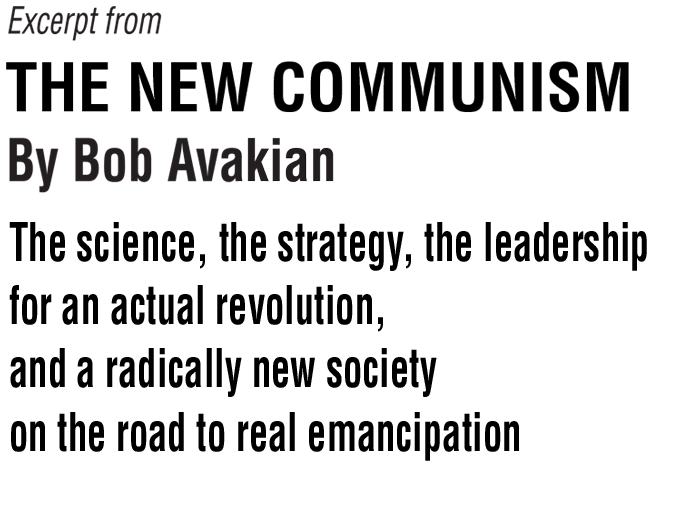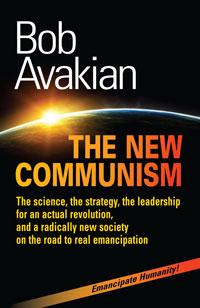
The following is an excerpt from the work by Bob Avakian, The New Communism. In addition to this and other excerpts posted on revcom.us, we will be running further excerpts from time to time on revcom.us. These excerpts should serve as encouragement and inspiration for people to get into the work as a whole, which is available as a book from Insight Press and as a PDF online at revcom.us.


This excerpt comes from the section titled "Foolish Victims of Deceit, and Self-Deceit."
Now, I’ve talked about the relations of production. So let’s get into that a little more. Again, Lenin did some valuable work for us which we should utilize. Lenin analyzed that there are three basic parts to the relations of production. One is ownership, whether or not you own what’s called the means of production: land, raw materials, factories, machinery and technology of various kinds. That’s the first and most fundamental thing in terms of relations of production. Do you own or do you not own means of production? Now you know what it means if you don’t own them: you got to go to work for somebody who does. Everybody knows about that. You don’t own a factory, you don’t own a hospital, and so on—well, you got to try to find a job from somebody who does, that’s the deal. So ownership (or non ownership) of technology, land, other means of production—that’s the most basic thing about the economic relations, the relations of production.
The next thing is what’s your role in the overall division of labor in society. This refers to the fact that there’s a whole process through which society is functioning, through which it’s producing the basic things people need to live and to reproduce. What role do you play in that? If you’re an owner of means of production, then you command all the people who work for you. If you’re somewhat lower down—say, you’re somebody in management—then you kind of occupy a middle position. You work for people who have ownership of means of production, but you also order a bunch of other people around below you. Or, if you’re working as an intellectual, in academia, or someone in a similar position, then you’re also sort of in a middle position in the overall division of labor of society. Or you may be on the bottom of society—either you have no job and you’re scuffling the way you can, or you get a job and somebody exploits you. And to get that job, you have to go and sell yourself. That’s what you do. You go in for a job interview and they say, “Well, now, let’s go into your history,” and all that. Sometimes they want you to piss in a bottle, and sometimes they want to know everything about your personal history, they want to know if you have ever been arrested, or do you have a felony conviction. And you can’t say, “What the fuck, just give me the job, goddamn it, I’m hungry!” You’re out the door. You can’t even more politely say, “Excuse me, but that’s kind of a personal question, don’t you think?” No, because the person interviewing you is in that middle position working for the people who own the means of production, and you don’t own any, so you’re in a powerless position, because if you don’t satisfy them, they don’t hire you. And you can’t go in there and turn things around and say, “Well, OK, since we’re having question and answer, let me ask you a question: Does the company you work for own anything in Bangladesh? Are you responsible for any of those fires over there in Bangladesh where all those women died in the fires in those factories?” Your ass is out the door. You don’t get to ask questions like that. That’s because, in the division of labor, you’re on the bottom. You own no means of production and you don’t have a lot of intellectual skills. You’ve been prevented from developing the kind of intellectual skills that might enable you to work in a more privileged position. You don’t have a college degree or a post-graduate degree that enables you to go into medicine and be a doctor, or go into management, or be working for one of the internet companies developing new technology, and so on. You are on the bottom.
And then we get to the third part of the relations of production: what is your share in the distribution of the overall income of society? Think about it. If you’re on the top, owning means of production, you may own billions of dollars, or hundreds of millions of dollars, worth of factories and machinery, and so on—not just in one country, but in many parts of the world—so you’re going to get a big share of the wealth. Even if you reinvest a lot of it to keep the process going and compete with others, you’re going to get a big share of the wealth. If you’re in the middle, with a certain amount of intellectual skills or owning a small amount of means of production—maybe you’re a small store owner or something, you own a little means of production or distribution but you don’t own much—then you’re going to get a lesser share. And if you’re on the bottom, owning nothing except your ability to work, and you don’t have a lot of highly developed skills, intellectual training, degrees and so on, you’re going to get a small share.
So if you put those three things together—whether you own a lot of means of production, or you own a little bit, or you own none; what your role is in the overall division of labor of the society; and consequently what share you have in the distribution of society’s wealth—then you can identify pretty much the class structure of a society. In very basic terms, you have the people at the top, the bourgeoisie (which is a French word that basically means capitalists, the capitalist class); then you have the petite bourgeoisie (“petite” is a French word that means small) so you have the small bourgeoisie, the “in between” class, made up of owners of a small amount of means of production, and people who’ve developed intellectual skills, have degrees, and so on, people in management or in medicine, and so on—and then you have the people at the bottom, the proletariat, which is a word that means people who don’t own anything except their ability to work. This is why you have different classes in society—it’s all related to what the economic system is and what people’s role is in that overall economic system.
So when we think about getting beyond class distinctions, we have to think about changing all that, as well as changing the kinds of social relations where men oppress women, where one “race,” or nationality, oppresses others, where some people have advantages over others in terms of having a high degree of intellectual training, degrees and so on, where they can work with their minds mainly, while other people, who of course also have minds and think, are forced to carry out manual labor. You have to get beyond all those things if you want to get rid of exploitation and oppression. This enables us to understand more deeply Lenin’s statement about how people are the foolish victims of deceit and self-deceit until they learn to recognize the class interests involved in things going on in society and the world as a whole. You have to look to the classes in society and see what economic and social relations, and what system of political power that enforces those relations, do different ideas serve. What class interests do those ideas actually express? Those corresponding to the outlook and interests of the big bourgeoisie? Or of the petite bourgeoisie? Or of the lower masses of people, the proletariat and the poor people?
But beyond that, if you just do that and you don’t dig deeper for the roots of all this, then it’s like the difference between a cow and a sheep. A cow comes along and eats the vegetation, but it leaves the roots. A sheep pulls everything up by the roots. That’s why in the Old West, they used to have all these range wars between the sheep owners and the cow owners: the cow owners got pissed off at the sheep owners because the sheep came along and pulled up all the plants, so then the cows couldn’t graze, whereas the cows just grazed along the surface so the plants would still grow back. Anyway, without getting too far afield with this awkward metaphor (!), the point is this: If you just look at classes, and that’s all, you’re not going to get to the roots. And if you want to really change something, you have to get to the roots.
Contents
Publisher's Note
Introduction and Orientation
Foolish Victims of Deceit, and Self-Deceit
Part I. Method and Approach, Communism as a Science
Materialism vs. Idealism
Dialectical Materialism
Through Which Mode of Production
The Basic Contradictions and Dynamics of Capitalism
The New Synthesis of Communism
The Basis for Revolution
Epistemology and Morality, Objective Truth and Relativist Nonsense
Self and a “Consumerist” Approach to Ideas
What Is Your Life Going to Be About?—Raising People’s SightsPart II. Socialism and the Advance to Communism:
A Radically Different Way the World Could Be, A Road to Real EmancipationThe “4 Alls”
Beyond the Narrow Horizon of Bourgeois Right
Socialism as an Economic System and a Political System—And a Transition to Communism
Internationalism
Abundance, Revolution, and the Advance to Communism—A Dialectical Materialist Understanding
The Importance of the “Parachute Point”—Even Now, and Even More With An Actual Revolution
The Constitution for the New Socialist Republic in North America—
Solid Core with a Lot of Elasticity on the Basis of the Solid Core
Emancipators of HumanityPart III. The Strategic Approach to An Actual Revolution
One Overall Strategic Approach
Hastening While Awaiting
Forces For Revolution
Separation of the Communist Movement from the Labor Movement, Driving Forces for Revolution
National Liberation and Proletarian Revolution
The Strategic Importance of the Struggle for the Emancipation of Women
The United Front under the Leadership of the Proletariat
Youth, Students and the Intelligentsia
Struggling Against Petit Bourgeois Modes of Thinking, While Maintaining the Correct Strategic Orientation
The “Two Maximizings”
The “5 Stops”
The Two Mainstays
Returning to "On the Possibility of Revolution"
Internationalism—Revolutionary Defeatism
Internationalism and an International Dimension
Internationalism—Bringing Forward Another Way
Popularizing the Strategy
Fundamental OrientationPart IV. The Leadership We Need
The Decisive Role of Leadership
A Leading Core of Intellectuals—and the Contradictions Bound Up with This
Another Kind of “Pyramid”
The Cultural Revolution Within the RCP
The Need for Communists to Be Communists
A Fundamentally Antagonistic Relation—and the Crucial Implications of That
Strengthening the Party—Qualitatively as well as Quantitatively
Forms of Revolutionary Organization, and the “Ohio”
Statesmen, and Strategic Commanders
Methods of Leadership, the Science and the “Art” of Leadership
Working Back from “On the Possibility”—
Another Application of “Solid Core with a Lot of Elasticity on the Basis of the Solid Core”Appendix 1:
The New Synthesis of Communism:
Fundamental Orientation, Method and Approach,
and Core Elements—An Outline
by Bob AvakianAppendix 2:
Framework and Guidelines for Study and DiscussionNotes
Selected List of Works Cited
About the Author